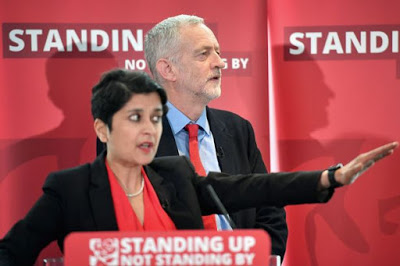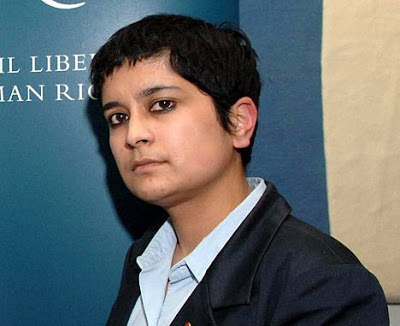 |
| Shami Chakrabarti & Jeremy Corbyn about to present report |
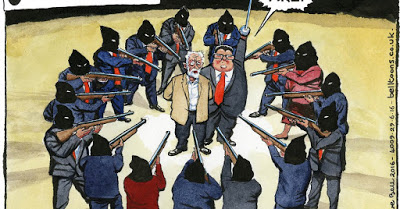 |
| The Chakrabarti Report took place in the context of other events |
The Chakrabarti Report Fails to Understand how anti-Semitism was Weaponised
On 29th April, as the media hyped ‘anti-Semitism’
hysteria in the Labour Party was in full swing, with daily revelations from
those doughty fighters against racism at the Daily Mail and Sun, Jeremy Corbyn set up
an inquiry into racism in the Labour Party under the former Chair of Liberty, Shami Chakrabarti. Chakrabarti is no radical and when it was
announced that Baroness Royall of Labour Friends of Israel was to become a Vice
Chair of the Inquiry I feared
that this Inquiry would simply become a rubber stamp for the Right of the
Labour Party and the Zionist Jewish Labour Movement.
hysteria in the Labour Party was in full swing, with daily revelations from
those doughty fighters against racism at the Daily Mail and Sun, Jeremy Corbyn set up
an inquiry into racism in the Labour Party under the former Chair of Liberty, Shami Chakrabarti. Chakrabarti is no radical and when it was
announced that Baroness Royall of Labour Friends of Israel was to become a Vice
Chair of the Inquiry I feared
that this Inquiry would simply become a rubber stamp for the Right of the
Labour Party and the Zionist Jewish Labour Movement.
The other Vice Chair, Professor David Feldman, was attacked
by the Jewish Chronicle for his links
to Independent Jewish Voices, a group which had expressed its concern “at the
proliferation of sweeping allegations of pervasive antisemitism within the
Labour Party.” ‘Labour
inquiry professor has links to group that says antisemitism claims are
“baseless”,’ Jewish Chronicle 2.5.16. I made a long submission to the Inquiry and
I gave evidence to the Inquiry two weeks ago.
by the Jewish Chronicle for his links
to Independent Jewish Voices, a group which had expressed its concern “at the
proliferation of sweeping allegations of pervasive antisemitism within the
Labour Party.” ‘Labour
inquiry professor has links to group that says antisemitism claims are
“baseless”,’ Jewish Chronicle 2.5.16. I made a long submission to the Inquiry and
I gave evidence to the Inquiry two weeks ago.
 |
| Jeremy Corbyn and Marc Wadsworth – Black anti-racist activist & victim of racist attack by Ruth Smeeth and Zionists |
When I gave evidence to Chakrabarti she made it clear
that the Inquiry Report was hers and hers alone. Baroness Royall of Labour Friends of Israel would
not determine its findings or outcome.
She was an advisor, nothing more.
So although my worst fears were not realised and the Inquiry did not
become a repetition of Royall’s rubber stamp ‘Inquiry’ into allegations of
anti-Semitism at Oxford University Labour Club, the Chakrabarti Report is
nonetheless flawed.
that the Inquiry Report was hers and hers alone. Baroness Royall of Labour Friends of Israel would
not determine its findings or outcome.
She was an advisor, nothing more.
So although my worst fears were not realised and the Inquiry did not
become a repetition of Royall’s rubber stamp ‘Inquiry’ into allegations of
anti-Semitism at Oxford University Labour Club, the Chakrabarti Report is
nonetheless flawed.
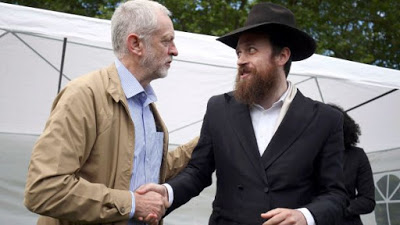 |
| Corbyn and Rabbi Mendy Korer |
There is no merit in pretending that Chakrabarti found
for the supporters of the Palestinians and opponents of Zionism in the Labour
Party. Whilst there are some welcome
recommendations, in particular over disciplinary procedures, the Inquiry
clearly falls down on the side of the Zionists politically.
for the supporters of the Palestinians and opponents of Zionism in the Labour
Party. Whilst there are some welcome
recommendations, in particular over disciplinary procedures, the Inquiry
clearly falls down on the side of the Zionists politically.
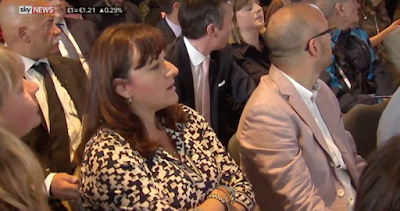 |
| Zionist Labour MP Ruth Smeeth – a False Victim of ‘anti-Semitism’ as she targets Marc Wadsworth, a Black activist |
The
Chakrabarti Report has been welcomed by both Richard Angell of Progress, for
whom any criticism of Zionism is de facto
anti-Semitic Grading
the Chakrabarti report, and Jeremy Newmark Chair of the
Jewish Labour Movement, who called the report a “sensible and firm platform” to
combat anti-Semitism. Report
says UK Labour Party not racist,
Jerusalem Post 1.7.16.
Chakrabarti Report has been welcomed by both Richard Angell of Progress, for
whom any criticism of Zionism is de facto
anti-Semitic Grading
the Chakrabarti report, and Jeremy Newmark Chair of the
Jewish Labour Movement, who called the report a “sensible and firm platform” to
combat anti-Semitism. Report
says UK Labour Party not racist,
Jerusalem Post 1.7.16.
The Chakrabarti Report has been welcomed by John Mann MP,
the boorish loud mouth who hectored and bullied Ken Livingstone. It is true that in a Parliamentary Labour
Party with an over-representation of the stupid and vain, Mann stands head and
shoulders above his compatriots. Nonetheless
when he declares that he was ‘delighted that every single one of the proposals
I made [to Chakrabarti] in (sic) included in her report’ we cannot just ignore his comments. John
Mann: The anti-Semitism report gives a route out of this mess this
cannot be ignored. Mann stated
that “For
the first time, it makes the use of ‘Zionist’ in a derogatory way a
disciplinary offence.’ This is wishful thinking on his part but it is close to the truth. Even a stuck clock is right twice a day.
the boorish loud mouth who hectored and bullied Ken Livingstone. It is true that in a Parliamentary Labour
Party with an over-representation of the stupid and vain, Mann stands head and
shoulders above his compatriots. Nonetheless
when he declares that he was ‘delighted that every single one of the proposals
I made [to Chakrabarti] in (sic) included in her report’ we cannot just ignore his comments. John
Mann: The anti-Semitism report gives a route out of this mess this
cannot be ignored. Mann stated
that “For
the first time, it makes the use of ‘Zionist’ in a derogatory way a
disciplinary offence.’ This is wishful thinking on his part but it is close to the truth. Even a stuck clock is right twice a day.
 |
| Ruth Smeeth MP – US Intelligence Asset who staged incident to present herself as fake victim of ‘anti-Semitism’ |
The best thing about the Report is the first line
which states that ‘The Labour Party is not overrun by antiSemitism,
Islamaphobia or other forms of racism.’
This is important because it negates the whole campaign which gave rise
to this report. However there are two
problems with this. Chakrabarti
immediately rows back on this saying that ‘I have heard too many Jewish voices
express concern that anti-Semitism has not been taken seriously enough in the
Labour Party and broader Left for some years.’
which states that ‘The Labour Party is not overrun by antiSemitism,
Islamaphobia or other forms of racism.’
This is important because it negates the whole campaign which gave rise
to this report. However there are two
problems with this. Chakrabarti
immediately rows back on this saying that ‘I have heard too many Jewish voices
express concern that anti-Semitism has not been taken seriously enough in the
Labour Party and broader Left for some years.’
Chakrabarti
avoids the central reason behind the setting up of the Inquiry, the false use
of anti-Semitism as a weapon against those who oppose Zionism and the Apartheid
State of Israel. Coupled with this is
what can be described as ‘false victimhood’.
Although Chakrabarti accepted our submissions over the Zionists’ misuse
of the MacPherson principles, she doesn’t draw any conclusions as to why the
Zionists have tried to subvert the MacPherson definition of a racial incident. Why are the Zionists so insistent that only
they can define what is an anti-Semitic incident?
avoids the central reason behind the setting up of the Inquiry, the false use
of anti-Semitism as a weapon against those who oppose Zionism and the Apartheid
State of Israel. Coupled with this is
what can be described as ‘false victimhood’.
Although Chakrabarti accepted our submissions over the Zionists’ misuse
of the MacPherson principles, she doesn’t draw any conclusions as to why the
Zionists have tried to subvert the MacPherson definition of a racial incident. Why are the Zionists so insistent that only
they can define what is an anti-Semitic incident?
What would Chakrabarti have said a quarter of a
century ago if opponents of Apartheid in South Africa had repeatedly been told
that they were ‘anti-White’ racists? It
is a constant of Zionist discourse that anyone supporting the Palestinians or
opposing their treatment by Israel is accused of ‘anti-Semitism’. An example of this occurred at the Chakrabarti
Report press conference itself when Marc Wadsworth, a Black anti-racist
activist, accused Labour MP, Ruth Smeeth, a spin doctor for BICOM, the main Zionist
propaganda group in this country, of feeding information to The Telegraph. Former
Israel
lobby spin doctor aims for seat in UK parliament, Wadsworth made no mention of Smeeth being
Jewish, indeed he didn’t know she was Jewish, yet this was spun by Smeeth and
the media as being an anti-Semitic incident.
century ago if opponents of Apartheid in South Africa had repeatedly been told
that they were ‘anti-White’ racists? It
is a constant of Zionist discourse that anyone supporting the Palestinians or
opposing their treatment by Israel is accused of ‘anti-Semitism’. An example of this occurred at the Chakrabarti
Report press conference itself when Marc Wadsworth, a Black anti-racist
activist, accused Labour MP, Ruth Smeeth, a spin doctor for BICOM, the main Zionist
propaganda group in this country, of feeding information to The Telegraph. Former
Israel
lobby spin doctor aims for seat in UK parliament, Wadsworth made no mention of Smeeth being
Jewish, indeed he didn’t know she was Jewish, yet this was spun by Smeeth and
the media as being an anti-Semitic incident.
The problem with Chakrabarti is that false claims of
‘anti-Semitism’ can be directed with impunity at Black anti-racist activists. It substitutes the subjective for the objective,
yet Smeeth proudly boasted on Twitter that Chakrabarti had apologised to her.
‘anti-Semitism’ can be directed with impunity at Black anti-racist activists. It substitutes the subjective for the objective,
yet Smeeth proudly boasted on Twitter that Chakrabarti had apologised to her.
The whole Report is suffused with subjectivity. Instead of defining anti-Semitism and
anti-Zionism from the outset and rejecting the ‘new anti-Semitism’ which sees
opposition to the Israeli state as anti-Semitic and Israel as the ‘Jew among
the nations’, Chakrabarti ignores the issue completely. There is no excuse for this. A number of submissions, including my own and IJV’s, spent some time on defining what is
and is not anti-Semitism. How can you
have a report on anti-Semitism which fails to define what it means by
anti-Semitism?
anti-Zionism from the outset and rejecting the ‘new anti-Semitism’ which sees
opposition to the Israeli state as anti-Semitic and Israel as the ‘Jew among
the nations’, Chakrabarti ignores the issue completely. There is no excuse for this. A number of submissions, including my own and IJV’s, spent some time on defining what is
and is not anti-Semitism. How can you
have a report on anti-Semitism which fails to define what it means by
anti-Semitism?
The Institute of Race Relations IRR’s
submission to the Labour Party Inquiry into anti-Semitism and other forms of
racism emphasised the difference between attitude and acts,
the subjective and objective. According
to the poisonous logic of identity politics, the rights of every group – be
they an oppressor or oppressed – are equally valid. So the rights of the Zionists are equally as
valid as those of the Palestinians. The
rights of ethnic cleansers are as important as those they drove out. If you challenge this then you are engaging
in a ‘hierarchy of oppressions’ which is not allowed. The subjective demands that you take all
claims at face value. Both bogus claims
of racism and actual racism are equal.
It therefore drains racism of any meaning and reduces it to personal
antagonism.
submission to the Labour Party Inquiry into anti-Semitism and other forms of
racism emphasised the difference between attitude and acts,
the subjective and objective. According
to the poisonous logic of identity politics, the rights of every group – be
they an oppressor or oppressed – are equally valid. So the rights of the Zionists are equally as
valid as those of the Palestinians. The
rights of ethnic cleansers are as important as those they drove out. If you challenge this then you are engaging
in a ‘hierarchy of oppressions’ which is not allowed. The subjective demands that you take all
claims at face value. Both bogus claims
of racism and actual racism are equal.
It therefore drains racism of any meaning and reduces it to personal
antagonism.
The Chakrabarti Report depoliticises racism. Instead
of being a product of the power relations in a society built on colonial
exploitation, including the slave trade, racism is nothing more than a difference
in colour or ethnicity. Black people can
therefore be equally as racist as White people.
Racism is reduced to the personal.
It has nothing to do with imperialism or Zionist settler
colonialism. Indeed the very use of the
word ‘Zionism’ is deprecated.
of being a product of the power relations in a society built on colonial
exploitation, including the slave trade, racism is nothing more than a difference
in colour or ethnicity. Black people can
therefore be equally as racist as White people.
Racism is reduced to the personal.
It has nothing to do with imperialism or Zionist settler
colonialism. Indeed the very use of the
word ‘Zionism’ is deprecated.
It was Lenin who made a clear distinction between the
nationalism of the oppressed and the oppressor:
“The
bourgeois nationalism of any oppressed nation has a general democratic content
that is directed against oppression and it is this content that we
unconditionally support.” The
Right of Nations to Self-Determination – 4. “PRACTICALITY” IN THE NATIONAL
QUESTION Chakrabarti does not recognise any such distinctions.
nationalism of the oppressed and the oppressor:
“The
bourgeois nationalism of any oppressed nation has a general democratic content
that is directed against oppression and it is this content that we
unconditionally support.” The
Right of Nations to Self-Determination – 4. “PRACTICALITY” IN THE NATIONAL
QUESTION Chakrabarti does not recognise any such distinctions.
The Zionists dress up their chauvinism and racism as
the ‘national self-determination of Jews’.
We should reject this. Jews are
not a nation and Zionism is not about ‘self-determination’ of the oppressed. National self-determination means the right
to be free from national oppression. The
rights of Israeli Jews or South African Whites was and is about the right to
exploit and oppress.
the ‘national self-determination of Jews’.
We should reject this. Jews are
not a nation and Zionism is not about ‘self-determination’ of the oppressed. National self-determination means the right
to be free from national oppression. The
rights of Israeli Jews or South African Whites was and is about the right to
exploit and oppress.
Chakrabarti bases her analysis on a subjective understanding
of anti-Semitism. Chakrabarti says that
there is ‘clear evidence’ of ‘minority hateful or ignorant attitudes and
behaviours’ which she ascribes to ‘incivility of discourse.’ This ‘clear evidence’ is never produced. It is politics by anecdote. Chakrabarti doesn’t say which Jewish voices
have expressed concern and what is the basis of that concern. When it comes to concrete acts of
discrimination Chakrabarti provides no examples whatsoever.
of anti-Semitism. Chakrabarti says that
there is ‘clear evidence’ of ‘minority hateful or ignorant attitudes and
behaviours’ which she ascribes to ‘incivility of discourse.’ This ‘clear evidence’ is never produced. It is politics by anecdote. Chakrabarti doesn’t say which Jewish voices
have expressed concern and what is the basis of that concern. When it comes to concrete acts of
discrimination Chakrabarti provides no examples whatsoever.
Racism is treated as an ideological phenomenon not a
material force. Attitudes and prejudice
are considered in isolation from the practical day to day reality of
racism. Chakrabarti fails to recognise
that anti-Semitism in Britain is extremely low.
The synthetic, media manufactured reports of ‘anti-Semitism’ in the
Labour Party owe nothing to anti-Semitism and everything to the desire to
remove Jeremy Corbyn as Leader.
material force. Attitudes and prejudice
are considered in isolation from the practical day to day reality of
racism. Chakrabarti fails to recognise
that anti-Semitism in Britain is extremely low.
The synthetic, media manufactured reports of ‘anti-Semitism’ in the
Labour Party owe nothing to anti-Semitism and everything to the desire to
remove Jeremy Corbyn as Leader.
Jewish people in Britain are not economically
disadvantaged or oppressed. They do not
do they suffer from institutional racism.
On the contrary Jews are among the most privileged sections of
society. The post-war history of British
Jews is the move from the East End of London to the outer suburbs of Hendon,
Golders Greet etc.. It was not only a
geographic but a political shift as Jews, who had voted overwhelmingly for
Labour up to the 1950’s, began to transfer their allegiance to the
Conservatives. In 1945 Phil Piratin
became one of only two elected Communist MPs in Britain for the Mile End constituency. Half his votes were estimated to be from
Jewish voters. It is inconceivable that such
a phenomenon could happen today.
disadvantaged or oppressed. They do not
do they suffer from institutional racism.
On the contrary Jews are among the most privileged sections of
society. The post-war history of British
Jews is the move from the East End of London to the outer suburbs of Hendon,
Golders Greet etc.. It was not only a
geographic but a political shift as Jews, who had voted overwhelmingly for
Labour up to the 1950’s, began to transfer their allegiance to the
Conservatives. In 1945 Phil Piratin
became one of only two elected Communist MPs in Britain for the Mile End constituency. Half his votes were estimated to be from
Jewish voters. It is inconceivable that such
a phenomenon could happen today.
This transfer of Jewish political allegiances
happened, not because of support for Israel but for socio-economic reasons.[1] William Rubinstein, former President of the Jewish
Historical Society, wrote that: ‘the rise
of Western Jewry to unparalleled affluence and high status has led to the
near-disappearance of a Jewish proletariat of any size; indeed, the Jews may
become the first ethnic group in history without a working-class of any size.’
[2] By 1961, more than 40% of Jews were located in
the upper two social classes compared to less than 20% of the general
population.[3]
happened, not because of support for Israel but for socio-economic reasons.[1] William Rubinstein, former President of the Jewish
Historical Society, wrote that: ‘the rise
of Western Jewry to unparalleled affluence and high status has led to the
near-disappearance of a Jewish proletariat of any size; indeed, the Jews may
become the first ethnic group in history without a working-class of any size.’
[2] By 1961, more than 40% of Jews were located in
the upper two social classes compared to less than 20% of the general
population.[3]
Contrast this with the non-White population of
Britain. They experience job
discrimination, Police and fascist violence, arson at mosques, demonisation in
the press and Parliament with the Prevent programme being directed at Muslims,
Stop and Search, targeting by Home Office campaigns against ‘illegal’
immigration etc. Unlike Jews, Black and
Ethnic Minority groups are under represented in Parliament and the upper
echelons of society. There is simply no
comparison between British Jews and Blacks, Asians and Muslims in Britain.
Britain. They experience job
discrimination, Police and fascist violence, arson at mosques, demonisation in
the press and Parliament with the Prevent programme being directed at Muslims,
Stop and Search, targeting by Home Office campaigns against ‘illegal’
immigration etc. Unlike Jews, Black and
Ethnic Minority groups are under represented in Parliament and the upper
echelons of society. There is simply no
comparison between British Jews and Blacks, Asians and Muslims in Britain.
Despite acknowledging
that Labour has not been overrun by anti-Semitism she writes that ‘there is too much
clear evidence (going back some years) of minority hateful or ignorant
attitudes and behaviours’ which she attributes to a ‘bitter incivility of
discourse.’
that Labour has not been overrun by anti-Semitism she writes that ‘there is too much
clear evidence (going back some years) of minority hateful or ignorant
attitudes and behaviours’ which she attributes to a ‘bitter incivility of
discourse.’
Failing to produce any concrete evidence of anti-Semitism,
Chakrabarti constantly refers to ‘courtesy and dialogue’ ‘kindness and
civility’ ‘incivility
of discourse.’ It is as if the problem
of racism can be located in bad manners and thoughtlessness. What Chakrabarti does is to depoliticise
racism and allow the false victimhood and bogus anti-racism of Zionism to be
counterposed to those who are active in anti-racist and anti-imperialist
campaigns. It is little wonder that a
majority of those who have been suspended for ‘anti-Semitism’ have been Black
or Asian activists or councillors.
Chakrabarti constantly refers to ‘courtesy and dialogue’ ‘kindness and
civility’ ‘incivility
of discourse.’ It is as if the problem
of racism can be located in bad manners and thoughtlessness. What Chakrabarti does is to depoliticise
racism and allow the false victimhood and bogus anti-racism of Zionism to be
counterposed to those who are active in anti-racist and anti-imperialist
campaigns. It is little wonder that a
majority of those who have been suspended for ‘anti-Semitism’ have been Black
or Asian activists or councillors.
Everything is rendered subjective. All that is solid melts into air. Real political struggles against oppression
and deprivation become transformed into the personal. Far from the personal being political, it is
anti-political and ultimately reactionary.
Incivility and discourtesy is held to be as oppressive as the
deprivation that comes from poverty.
After all, even the rich and powerful have feelings!
and deprivation become transformed into the personal. Far from the personal being political, it is
anti-political and ultimately reactionary.
Incivility and discourtesy is held to be as oppressive as the
deprivation that comes from poverty.
After all, even the rich and powerful have feelings!
So when someone who is Jewish is offended by solidarity
with the Palestinians, as happened when Oxford University Labour Club supported
Israel Apartheid Week or comments are made about Zionism and media conspiracies,
then this is as valid as outrage over the imprisonment of Palestinian children. Indeed even the mention of Israeli brutality
may be perceived as offending Jewish sensibilities and thus be
‘anti-Semitic’.
with the Palestinians, as happened when Oxford University Labour Club supported
Israel Apartheid Week or comments are made about Zionism and media conspiracies,
then this is as valid as outrage over the imprisonment of Palestinian children. Indeed even the mention of Israeli brutality
may be perceived as offending Jewish sensibilities and thus be
‘anti-Semitic’.
Chakrabarti holds that: ‘Notwithstanding a vibrant Palestinian solidarity
tradition, of all British political parties the Labour Party has the longest
and most consistent record of support for Zionism, and the Labour Government
quickly moved to recognise the new state of Israel upon its formation in 1948.’ Chakrabarti treats this as a matter of pride
rather than shame and regret.
tradition, of all British political parties the Labour Party has the longest
and most consistent record of support for Zionism, and the Labour Government
quickly moved to recognise the new state of Israel upon its formation in 1948.’ Chakrabarti treats this as a matter of pride
rather than shame and regret.
The Labour Party also has a long standing and
consistent record of support for imperialism and the British Empire. Apart from those around the Movement for
Colonial Freedom (Liberation) Labour subscribed to the ‘constructivist’ Fabian
notion of Trusteeship, whereby Britain’s African colonies were held ‘in trust’
for the indigenous people who first needed to be ‘civilised’ before they could
be allowed self-government. Racism and
imperialism were the handmaidens of social democracy and Chakrabarti
pays tribute to it.
consistent record of support for imperialism and the British Empire. Apart from those around the Movement for
Colonial Freedom (Liberation) Labour subscribed to the ‘constructivist’ Fabian
notion of Trusteeship, whereby Britain’s African colonies were held ‘in trust’
for the indigenous people who first needed to be ‘civilised’ before they could
be allowed self-government. Racism and
imperialism were the handmaidens of social democracy and Chakrabarti
pays tribute to it.
When the Attlee government took power in 1945, the
previous Conservative Colonial Secretary, Oliver Stanley, said of the policy of
the new Labour Secretary for the Colonies, George Hall that: ‘I listened to it with great interest, and I
must confess with a certain amount of familiarity. It did not seem to differ greatly in
essentials from the policies which have been declared on previous occasions.’ [4] Bipartisanship with the Conservatives over
foreign and colonial policy has always been the order of the day.
previous Conservative Colonial Secretary, Oliver Stanley, said of the policy of
the new Labour Secretary for the Colonies, George Hall that: ‘I listened to it with great interest, and I
must confess with a certain amount of familiarity. It did not seem to differ greatly in
essentials from the policies which have been declared on previous occasions.’ [4] Bipartisanship with the Conservatives over
foreign and colonial policy has always been the order of the day.
Chakrabarti declares in the section ‘History’ dealing
with Labour’s past and present relations with minority groups, including Jews, that
‘This
Inquiry is not about the wisdom of substantive policy, but rather, about the
tone of constructive debate.’ That
however is the problem as it is substantive policy from the Iraq War to the
Prevent and Domestic Extremism programmes which have led directly to the
intensification of anti-Muslim racism.
Black and Asian members naturally feel solidarity with the Palestinians
given Israel’s support for Apartheid in South Africa and its repressive role
internationally. The attempt to subsume
political differences behind the ‘tone’ of political debate is a mask with
which to disguise Labour’s support for the oppressive and racist policies of
the British state.
with Labour’s past and present relations with minority groups, including Jews, that
‘This
Inquiry is not about the wisdom of substantive policy, but rather, about the
tone of constructive debate.’ That
however is the problem as it is substantive policy from the Iraq War to the
Prevent and Domestic Extremism programmes which have led directly to the
intensification of anti-Muslim racism.
Black and Asian members naturally feel solidarity with the Palestinians
given Israel’s support for Apartheid in South Africa and its repressive role
internationally. The attempt to subsume
political differences behind the ‘tone’ of political debate is a mask with
which to disguise Labour’s support for the oppressive and racist policies of
the British state.
Chakrabarti argues that no one should be required to condemn
human rights abuses because of their religion or race. That is true but it is besides the
point. Zionist organisations, including
the Jewish Labour Movement , the British wing of the Israeli Labour
Party, have made it clear that passing policy critical of Zionism or Israel is
in itself anti-Semitic because it is challenges Jewish identity. The JLM’s proposed change to Labour
Party rules states that ‘it is not acceptable to use Zionism as a term of
abuse’. The problem is that Zionism, the settler
colonial movement that ethnically cleansed Palestine of its indigenous
population and which holds that Israel is a state of its Jewish citizens as
opposed to all of its citizens, is an abusive and racist movement. How is it possible to employ the term
‘Zionism’ in a non-abusive fashion? Is
there a non-abusive form of Apartheid?
human rights abuses because of their religion or race. That is true but it is besides the
point. Zionist organisations, including
the Jewish Labour Movement , the British wing of the Israeli Labour
Party, have made it clear that passing policy critical of Zionism or Israel is
in itself anti-Semitic because it is challenges Jewish identity. The JLM’s proposed change to Labour
Party rules states that ‘it is not acceptable to use Zionism as a term of
abuse’. The problem is that Zionism, the settler
colonial movement that ethnically cleansed Palestine of its indigenous
population and which holds that Israel is a state of its Jewish citizens as
opposed to all of its citizens, is an abusive and racist movement. How is it possible to employ the term
‘Zionism’ in a non-abusive fashion? Is
there a non-abusive form of Apartheid?
Chakrabarti defines
‘Zio’ as a racist epithet. It’s not a
term that I would employ outside Twitter, with its 140 character recognition
limit, but it is not a term of racial abuse.
‘Zio’ is short for ‘Zionist’ i.e. someone who is a supporter of Zionism. It is not an ethnic but a political
category. As such it cannot be a
racially offensive term. Chakrabarti
suggests it should be banned because it will ‘undermine the atmosphere’ of the
Labour Party. In other words we should
do nothing to upset Labour’s support for Israel and Zionism.
‘Zio’ as a racist epithet. It’s not a
term that I would employ outside Twitter, with its 140 character recognition
limit, but it is not a term of racial abuse.
‘Zio’ is short for ‘Zionist’ i.e. someone who is a supporter of Zionism. It is not an ethnic but a political
category. As such it cannot be a
racially offensive term. Chakrabarti
suggests it should be banned because it will ‘undermine the atmosphere’ of the
Labour Party. In other words we should
do nothing to upset Labour’s support for Israel and Zionism.
If Chakrabarti wanted to
outlaw racist epithets then the Zionist term ‘self-hater’, which is levelled at
Jewish anti-Zionists should be outlawed. German anti-fascists were accused of self-hatred by the Nazis because
they were held to hate their race and nation.
Those who refuse to accept this are held to hate their race and nation
and thus themselves.
outlaw racist epithets then the Zionist term ‘self-hater’, which is levelled at
Jewish anti-Zionists should be outlawed. German anti-fascists were accused of self-hatred by the Nazis because
they were held to hate their race and nation.
Those who refuse to accept this are held to hate their race and nation
and thus themselves.
Chakrabarti’s section on
stereotyping is unremarkable except for her comment that ‘I have heard from
Jewish students expected to either defend or condemn the policies of the
Israeli government.’ This is the exact
opposite to what actually occurs. Jewish
societies on campus are part of the Union of Jewish Students and as such they are
constitutionally bound to advocate for Israel. Those Jewish societies which have tried to
resist this have been threatened with disaffiliation. see Rewriting
the Holocaust
stereotyping is unremarkable except for her comment that ‘I have heard from
Jewish students expected to either defend or condemn the policies of the
Israeli government.’ This is the exact
opposite to what actually occurs. Jewish
societies on campus are part of the Union of Jewish Students and as such they are
constitutionally bound to advocate for Israel. Those Jewish societies which have tried to
resist this have been threatened with disaffiliation. see Rewriting
the Holocaust
Chakrabarti’s
recommendation that ‘Labour members resist the use of Hitler, Nazi and
Holocaust metaphors’ because it is ‘intended to be incendiary rather than
persuasive’ should be resisted. This is a
nod towards the issue that led to the suspension of Ken Livingstone. The Holocaust serves as the primary symbolic
justification for the existence of Israel as a Jewish state. Thousands of young Israeli Jews are taken to
Auschwitz each year in order to emphasise the message that only a militarily
strong Israel guarantees that there will be no second holocaust. Auschwitz is used, not as a warning against
racism, but as the justification for a Jewish supremacist state whose existence
is predicated on a permanent majority for its Jewish component. Fear of an Arab demographic majority is
pervasive and guides Israel’s internal settler colonial policy of
Judaisation. This is what lies behind
the Israeli government’s support for campaigns against miscegenation including funding
the fascist Lehava group. Inter-marriage
isn’t so much a religious as a racial imperative. It is this mentality which led to the banning
of a book Borderlife from the syllabus of Israeli high schools – it
portrayed a relationship between Jewish and Arab teenagers and thus undermine
the national Jewish identity that the JLM are so fond of. Israel Bans Novel
on Arab-Jewish Romance From Schools for ‘Threatening Jewish Identity’, Ha’aretz
31.12.15.
recommendation that ‘Labour members resist the use of Hitler, Nazi and
Holocaust metaphors’ because it is ‘intended to be incendiary rather than
persuasive’ should be resisted. This is a
nod towards the issue that led to the suspension of Ken Livingstone. The Holocaust serves as the primary symbolic
justification for the existence of Israel as a Jewish state. Thousands of young Israeli Jews are taken to
Auschwitz each year in order to emphasise the message that only a militarily
strong Israel guarantees that there will be no second holocaust. Auschwitz is used, not as a warning against
racism, but as the justification for a Jewish supremacist state whose existence
is predicated on a permanent majority for its Jewish component. Fear of an Arab demographic majority is
pervasive and guides Israel’s internal settler colonial policy of
Judaisation. This is what lies behind
the Israeli government’s support for campaigns against miscegenation including funding
the fascist Lehava group. Inter-marriage
isn’t so much a religious as a racial imperative. It is this mentality which led to the banning
of a book Borderlife from the syllabus of Israeli high schools – it
portrayed a relationship between Jewish and Arab teenagers and thus undermine
the national Jewish identity that the JLM are so fond of. Israel Bans Novel
on Arab-Jewish Romance From Schools for ‘Threatening Jewish Identity’, Ha’aretz
31.12.15.
When Benjamin Netanyahu
addressed the 37th World
Zionist Congress in 2015, he attempted to shift the blame for the Holocaust
from the Nazis to the Mufti of Jerusalem.
Hitler had only been interested in expelling the Jews. It was the Palestinian leader who persuaded
him to murder them. Despite his historical
ignorance, what Netanyahu said was in accordance with existing Zionist
propaganda which portrays the Palestinians as the new Nazis.
addressed the 37th World
Zionist Congress in 2015, he attempted to shift the blame for the Holocaust
from the Nazis to the Mufti of Jerusalem.
Hitler had only been interested in expelling the Jews. It was the Palestinian leader who persuaded
him to murder them. Despite his historical
ignorance, what Netanyahu said was in accordance with existing Zionist
propaganda which portrays the Palestinians as the new Nazis.
Holocaust metaphors are
to Zionism what cricket and warm beer is to Britain. In Israel, as even Chakrabarti acknowledges,
the use of holocaust slurs against one’s opponents is second nature. Outside Israel too the justification for
Israel’s atrocities is made with reference to the Holocaust.
to Zionism what cricket and warm beer is to Britain. In Israel, as even Chakrabarti acknowledges,
the use of holocaust slurs against one’s opponents is second nature. Outside Israel too the justification for
Israel’s atrocities is made with reference to the Holocaust.
But even if Zionism did
not make reference to the Holocaust then use of such analogies would be
justified. There are too many
comparisons between Israel and Nazi Germany.
One of the reasons for my own suspensions was that I, like Hannah
Arendt, had compared Israel’s marriage laws to the Nuremberg laws.
not make reference to the Holocaust then use of such analogies would be
justified. There are too many
comparisons between Israel and Nazi Germany.
One of the reasons for my own suspensions was that I, like Hannah
Arendt, had compared Israel’s marriage laws to the Nuremberg laws.
Chakrabarti recommends
that we should ‘leave Hitler, the Nazis and the Holocaust out of it’ and
instead use ‘the modern universal language of human rights, be it of
dispossession, discrimination, segregation, occupation or persecution’ instead. This goes to the root of the problem with
Chakrabarti. Israel is not merely a
state that abuses human rights. What
makes Israel different is the Zionist ideology that led to a state based on
racial supremacy and segregation. Israel,
both ideologically and practically, mirrors many of the practices of the Nazi
state prior to the Holocaust. Indeed
there are powerful voices in Israel which advocate the open murder of
Palestinians. No less than 57% of
Israelis supported an Israeli soldier Elor Azaria who executed a severely wounded
Palestinian lying on the ground, compared to just 20% who opposed his action. Israeli
soldier filmed executing wounded Palestinian man A large Tel Aviv demonstration in his
support mobilised under a banner proclaiming ‘Kill them all’. Amidst the mob that was chanting ‘death to
the Arabs’ was a poster that bore the slogan ‘My honour is my loyalty’, the slogan
of the SS.
that we should ‘leave Hitler, the Nazis and the Holocaust out of it’ and
instead use ‘the modern universal language of human rights, be it of
dispossession, discrimination, segregation, occupation or persecution’ instead. This goes to the root of the problem with
Chakrabarti. Israel is not merely a
state that abuses human rights. What
makes Israel different is the Zionist ideology that led to a state based on
racial supremacy and segregation. Israel,
both ideologically and practically, mirrors many of the practices of the Nazi
state prior to the Holocaust. Indeed
there are powerful voices in Israel which advocate the open murder of
Palestinians. No less than 57% of
Israelis supported an Israeli soldier Elor Azaria who executed a severely wounded
Palestinian lying on the ground, compared to just 20% who opposed his action. Israeli
soldier filmed executing wounded Palestinian man A large Tel Aviv demonstration in his
support mobilised under a banner proclaiming ‘Kill them all’. Amidst the mob that was chanting ‘death to
the Arabs’ was a poster that bore the slogan ‘My honour is my loyalty’, the slogan
of the SS.
The exclusion of Arabs
from 93% of Israeli land mirrors the exclusion of Jews from German land. It is equally right to compare the sealing
off of Gaza to the Warsaw Ghetto. It was
Marek Edelman, the last Commander of the Jewish Resistance in Warsaw who, much
to the chagrin of Zionism, compared the Palestinian fighters to the Jewish
resistance fighters. Letter to ‘Palestinian Partisans’ Raises International
Storm, Ha’aretz 9.8.02, The
‘death to the Arabs’ mobs in Israel mirror the anti-Jewish mobs in the Europe
of the 1930’s.
from 93% of Israeli land mirrors the exclusion of Jews from German land. It is equally right to compare the sealing
off of Gaza to the Warsaw Ghetto. It was
Marek Edelman, the last Commander of the Jewish Resistance in Warsaw who, much
to the chagrin of Zionism, compared the Palestinian fighters to the Jewish
resistance fighters. Letter to ‘Palestinian Partisans’ Raises International
Storm, Ha’aretz 9.8.02, The
‘death to the Arabs’ mobs in Israel mirror the anti-Jewish mobs in the Europe
of the 1930’s.
Chakrabarti discusses
the use of ‘Zionist’ and ‘Zionism’ and advises us to ‘use the term “Zionist”
advisedly, carefully and never euphemistically or as part of personal
abuse.’ Again she reduces the political
to the personal. Although she doesn’t
recommend that its use be outlawed
entirely, as the Jewish Labour Movement would like, she goes more than half-way
to meet them. Of course fascists have long-used the terms Jew
and Zionist interchangeably. But Zionists
also do the same, hence their slogan that anti-Zionism is anti-Semitism. See for
example No, Peter Beinart:
Anti-Zionism Is Indeed a Form of anti-Semitism, Ha’aretz 20.4.16.
Chakrabarti talks about people ‘redefining their Zionism’. You can redefine racism as many times as you
want but it is still racism, whatever colour you put on it.
the use of ‘Zionist’ and ‘Zionism’ and advises us to ‘use the term “Zionist”
advisedly, carefully and never euphemistically or as part of personal
abuse.’ Again she reduces the political
to the personal. Although she doesn’t
recommend that its use be outlawed
entirely, as the Jewish Labour Movement would like, she goes more than half-way
to meet them. Of course fascists have long-used the terms Jew
and Zionist interchangeably. But Zionists
also do the same, hence their slogan that anti-Zionism is anti-Semitism. See for
example No, Peter Beinart:
Anti-Zionism Is Indeed a Form of anti-Semitism, Ha’aretz 20.4.16.
Chakrabarti talks about people ‘redefining their Zionism’. You can redefine racism as many times as you
want but it is still racism, whatever colour you put on it.
However even in the darkest room
there is usually a glimmer of light. So
it is with the Chakrabarti Report. Under ‘Clear and Transparent Compliance
Procedures for Dealing with Allegations’ Chakrabarti makes stringent criticism
of the current procedures whereby members are suspended at whim, without even
being told the nature of the allegations against them, still less the identity
of those making the complaints. When I
gave evidence to Chakrabarti it became clear that this was the area where we
could expect the Report to make its most stringent criticisms of the current
witch hunt.
there is usually a glimmer of light. So
it is with the Chakrabarti Report. Under ‘Clear and Transparent Compliance
Procedures for Dealing with Allegations’ Chakrabarti makes stringent criticism
of the current procedures whereby members are suspended at whim, without even
being told the nature of the allegations against them, still less the identity
of those making the complaints. When I
gave evidence to Chakrabarti it became clear that this was the area where we
could expect the Report to make its most stringent criticisms of the current
witch hunt.
Chakrabarti recommends
that ‘those
in respect of whom allegations have been made are clearly informed of the
allegation(s) made against them, their factual basis and the identity of the
complainant’, something which Iain McNicol, the hapless General Secretary of
the Labour Party has so far refused to do.
that ‘those
in respect of whom allegations have been made are clearly informed of the
allegation(s) made against them, their factual basis and the identity of the
complainant’, something which Iain McNicol, the hapless General Secretary of
the Labour Party has so far refused to do.
Chakrabarti speaks about ‘avoiding
the risk or perception of abuse of power in matters of internal discipline’ as
one would expect from someone with her record in a civil liberties
organisation. However at the end of the
day it matters little, whether or not there are clear and transparent
procedures, if the Labour Party expels someone for being an anti-Zionist.
the risk or perception of abuse of power in matters of internal discipline’ as
one would expect from someone with her record in a civil liberties
organisation. However at the end of the
day it matters little, whether or not there are clear and transparent
procedures, if the Labour Party expels someone for being an anti-Zionist.
Perhaps
the best part of the Report is when Chakrabarti raises, albeit tangentially,
the context of the current witchhunt when she speaks of looking at the
motivation of those making the allegations.
She speaks of ‘a hostile journalist or political rival conducting a
trawling exercise or fishing expedition in relation to a particular person or
group of people within the Labour Party.’
Although this is a tentative stab in the right direction, she immediately
backtracks saying that ‘ I am not going so far to say that a politically
motivated complaint should always be disregarded, just that motivation may have
relevance, as will context’.
the best part of the Report is when Chakrabarti raises, albeit tangentially,
the context of the current witchhunt when she speaks of looking at the
motivation of those making the allegations.
She speaks of ‘a hostile journalist or political rival conducting a
trawling exercise or fishing expedition in relation to a particular person or
group of people within the Labour Party.’
Although this is a tentative stab in the right direction, she immediately
backtracks saying that ‘ I am not going so far to say that a politically
motivated complaint should always be disregarded, just that motivation may have
relevance, as will context’.
Chakrabarti
deals effectively with the JLM attempt to distort the MacPherson definition of
a racial incident. The JLM proposed an
amendment to the Labour Party’s rule book which would mean that the word of a
‘victim’ of a racial incident would be accepted at face value rather than being
objectively tested. Their amendment reads:
deals effectively with the JLM attempt to distort the MacPherson definition of
a racial incident. The JLM proposed an
amendment to the Labour Party’s rule book which would mean that the word of a
‘victim’ of a racial incident would be accepted at face value rather than being
objectively tested. Their amendment reads:
“Where a member is responsible for a hate
incident, being defined as something where the victim or anyone else think it
was motivated by hostility or prejudice based on…. the NEC may have the right
to impose the appropriate
disciplinary options…’ According to the
JLM ‘the Macpherson definition of a racist incident… places
particular value upon the perception of the victim/victim group.’
incident, being defined as something where the victim or anyone else think it
was motivated by hostility or prejudice based on…. the NEC may have the right
to impose the appropriate
disciplinary options…’ According to the
JLM ‘the Macpherson definition of a racist incident… places
particular value upon the perception of the victim/victim group.’
In other words a racist or a Zionist
could define themselves as a victim and the NEC would be obliged to expel the
‘perpetrator’ since it would be the victim who defines the incident. Chakrabarti makes it clear that the ‘purpose
of the [MacPherson] approach is to ensure that investigators handle a complaint
with particular sensitivity towards the victim…. However it will be for the
investigation and any subsequent process to determine whether my complaint was
ultimately well-founded.’
could define themselves as a victim and the NEC would be obliged to expel the
‘perpetrator’ since it would be the victim who defines the incident. Chakrabarti makes it clear that the ‘purpose
of the [MacPherson] approach is to ensure that investigators handle a complaint
with particular sensitivity towards the victim…. However it will be for the
investigation and any subsequent process to determine whether my complaint was
ultimately well-founded.’
Likewise
Chakrabarti makes caustic comment about the readiness of the Labour Party’s
Blairite civil service to suspend members at the drop of a hat. She speaks of the principles of natural
justice observing that ‘Civil courts do not grant interim injunctions, nor
criminal courts issue arrest warrants every time a complaint is made’ and raising
the European law concept of proportionality
– which Brexit is no doubt going to eradicate!
There are a number of technical proposals, such as lesser sanctions than
expulsion and the introduction of a new legal member of the Labour Party staff
which may simply ensure that decisions are more legal proof in the end, thus working
to the disadvantage of those subject to disciplinary action.
Chakrabarti makes caustic comment about the readiness of the Labour Party’s
Blairite civil service to suspend members at the drop of a hat. She speaks of the principles of natural
justice observing that ‘Civil courts do not grant interim injunctions, nor
criminal courts issue arrest warrants every time a complaint is made’ and raising
the European law concept of proportionality
– which Brexit is no doubt going to eradicate!
There are a number of technical proposals, such as lesser sanctions than
expulsion and the introduction of a new legal member of the Labour Party staff
which may simply ensure that decisions are more legal proof in the end, thus working
to the disadvantage of those subject to disciplinary action.
One
of the principal recommendations of Baroness Royall’s ‘Inquiry’ was that the
Jewish Labour Movement, which is affiliated to the ethnic cleansers and settlement
funders of the World Zionist Organisation, should be responsible for
anti-racism training for Labour students.
I remarked in my submission that this was akin to employing the late
Harold Shipman to develop courses in medical ethics. Having racists develop anti-racism courses is
indeed a novel proposal.
of the principal recommendations of Baroness Royall’s ‘Inquiry’ was that the
Jewish Labour Movement, which is affiliated to the ethnic cleansers and settlement
funders of the World Zionist Organisation, should be responsible for
anti-racism training for Labour students.
I remarked in my submission that this was akin to employing the late
Harold Shipman to develop courses in medical ethics. Having racists develop anti-racism courses is
indeed a novel proposal.
Chakrabarti doesn’t mention the JLM in the
Report or Royall’s proposal, despite nearly 90 Jews writing in specifically on
the subject of the JLM and its claim to be the Jewish section of the Labour
Party. Chakrabarti speaks of ‘critiques
of the idea that anti-racism training can ever be effective and nervousness
that one strand or another in the Party’s thinking should be given a privileged
position in relation to describing and disseminating the boundaries of
acceptable attitudes and behaviour.’
This may be a subtle hint that Royall’s proposals re the JLM are a step
too far. Chakrabarti says that ‘On
reflection, and having gauged the range of feelings within the Party, it is not
my view that narrow anti-racism training programmes are what is required.’ The Institute of Race Relations, which made
an excellent submission to the Inquiry, came down firmly against ‘racism
awareness training’ which is part of an Orientalist and colonial tradition of
getting to know the enemy better.
Report or Royall’s proposal, despite nearly 90 Jews writing in specifically on
the subject of the JLM and its claim to be the Jewish section of the Labour
Party. Chakrabarti speaks of ‘critiques
of the idea that anti-racism training can ever be effective and nervousness
that one strand or another in the Party’s thinking should be given a privileged
position in relation to describing and disseminating the boundaries of
acceptable attitudes and behaviour.’
This may be a subtle hint that Royall’s proposals re the JLM are a step
too far. Chakrabarti says that ‘On
reflection, and having gauged the range of feelings within the Party, it is not
my view that narrow anti-racism training programmes are what is required.’ The Institute of Race Relations, which made
an excellent submission to the Inquiry, came down firmly against ‘racism
awareness training’ which is part of an Orientalist and colonial tradition of
getting to know the enemy better.
Chakrabarti
‘s suggestion that in four Birmingham where Muslims predominate, which have
been under ‘special measures’ i.e. subject to the whim and dictate of the
Labour Party’s unaccountable regional organisers, for up to 23 years, this
regime should be reviewed with some urgency.
The original ‘problem’ was the recruitment of Muslims to the Labour
Party. These measures date from the
regime of Baron Kinnock. Chakrabarti
also points to the all-white nature of Labour Party staff, and the consequent development
of racist attitudes.
‘s suggestion that in four Birmingham where Muslims predominate, which have
been under ‘special measures’ i.e. subject to the whim and dictate of the
Labour Party’s unaccountable regional organisers, for up to 23 years, this
regime should be reviewed with some urgency.
The original ‘problem’ was the recruitment of Muslims to the Labour
Party. These measures date from the
regime of Baron Kinnock. Chakrabarti
also points to the all-white nature of Labour Party staff, and the consequent development
of racist attitudes.
The
Chakrabarti Report is a mixed bag. It
contains some welcome proposals on procedure but this is offset by its
fundamental political weakness when it comes to anti-Semitism. Its failure to appreciate or understand that
the issue of anti-Semitism is nearly always raised, not as an issue in its own
right but as a defence mechanism by Israel and Zionism’s supporters, mars the
Report.
Chakrabarti Report is a mixed bag. It
contains some welcome proposals on procedure but this is offset by its
fundamental political weakness when it comes to anti-Semitism. Its failure to appreciate or understand that
the issue of anti-Semitism is nearly always raised, not as an issue in its own
right but as a defence mechanism by Israel and Zionism’s supporters, mars the
Report.
Tony
Greenstein
Greenstein
Posted in Blog
